Vasilevsky on Chimaev: Be glad a Russian-speaking athlete became UFC champion.
In the tumultuous world of mixed martial arts, where national allegiances are often as fiercely contested as the bouts themselves, the recent coronation of Khamzat Chimaev as the UFC middleweight champion at UFC 319 has ignited a complex debate that cuts to the very heart of modern athletic identity. Rather than a simple narrative of national triumph, Chimaev’s victory over Dricus du Plessis by unanimous decision has become a Rorschach test for fans and pundits, a scenario where his subsequent raising of the UAE flag—the nation he officially represents in the promotion—has been met with a peculiar sense of ownership and debate within the Russian-speaking combat community.Stepping into this fray with the clarity of a perfectly executed jab is fellow MMA fighter Vyacheslav Vasilevsky, who delivered a powerful and pragmatic perspective that deserves a deeper examination. Vasilevsky immediately reframes the conversation, asking a fundamental question: 'Who is a fighter representing Russia?' He points out that Chimaev, despite his Chechen roots, lived in Sweden for a considerable period, and before his meteoric rise to superstardom, his connection to Russia was scarcely a topic of public discourse.To Vasilevsky, the subsequent 'clinging to these questions' is a counterproductive exercise, a form of pedantry that overlooks the monumental human effort required to reach the pinnacle of the sport. 'A man gave his all to earn a name and money for himself,' he states, a sentiment that echoes the universal struggle of any athlete, from a La Masia graduate at Barcelona to a draft pick fighting for a starting spot in the NBA; the sacrifice is a currency that transcends borders.He concedes that Chimaev likely 'partly considers himself a Russian athlete,' a nuanced position supported by the fighter's frequent travels to Russia for training and his fluent use of the Russian language. 'I don't think Chimaev disowns Russia,' Vasilevsky asserts, dismissing the notion that the fighter's choice of flag is a act of renunciation.His most compelling argument, however, is his call for a broader, more celebratory perspective: 'It's silly to catch him on his words or some of his actions. If Khamzat hadn't done all this, we wouldn't be talking about him.Be glad that an athlete who speaks Russian became champion. ' This isn't just a comment on a single fight; it's a profound lesson in sports analytics and fandom.In an era where we relentlessly compare athletes to legends of the past, dissecting their every move with statistical models and historical parallels, we often lose sight of the raw, human achievement. Vasilevsky is essentially arguing for a focus on the performance itself—the dominant wrestling, the relentless pressure, the strategic brilliance that secured the belt—over the symbolic politics that surround it.The context here is critical. The UFC has evolved into a truly global league, a sporting United Nations where fighters like Israel Adesanya represent New Zealand with Nigerian heritage, and Francis Ngannou carried the Cameroonian flag with immense pride.This fluidity of identity is a hallmark of the modern sporting landscape, and to impose rigid, 20th-century notions of nationality upon it is to misunderstand its very nature. Chimaev's situation is further complicated by the geopolitical realities and the personal opportunities that the UAE has provided, a pragmatic career decision akin to a top-tier footballer choosing a club that offers the best platform for his talents, regardless of its league.To view his flag-raising as a purely political statement is to ignore the complex matrix of management, sponsorship, and residency that defines a professional fighter's career. Vasilevsky’s commentary, therefore, serves as a necessary corrective.It urges us to appreciate the artistry of the combat, the dedication required to become a champion, and the unifying power of a shared language and cultural connection, even when it isn't neatly packaged under a single flag. In the end, the legacy of a fighter like Khamzat Chimaev will be written not by the flag he held aloft in a moment of victory, but by the highlights of his fights, the records he breaks, and the inspiration he provides to a generation of fighters—Russian-speaking or otherwise—who see in him a testament to what is possible through sheer, unadulterated will.
It’s quiet here...Start the conversation by leaving the first comment.
